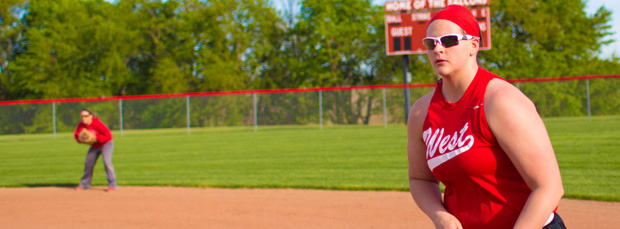
Falcons’ fastpitch softball player, Lexy Monty, 16, has her eye on West’s homerun record, which she hopes to break this fall. She has met the career 17 home runs and is now entering her sophomore season — she’s swinging for one more to hold the title outright. “I’ve loved the game since I was 7-years-old,” says Lexy, who is the team’s pitcher and also plays first base. “Fastpitch is incredibly fun for me. I have a great passion to play, and I love to compete with other players who share the same passion for the sport as I do.”
Lexy’s enthusiastic dedication to both pitching and hitting came close to ending her career, however, when she suffered a shoulder injury during a national tournament. “Last summer my arm was gradually getting more painful when I threw. When I was at Nationals, my arm went numb, and although it got better for a short time, the pain in my bicep worsened,” she recalls.
“She was throwing so much,” says Dave Monty. “My wife Kimber saw Lexy on the field holding her arm in obvious pain. Kimber decided it was time for Lexy to get rest and seek a physician’s opinion.” Although Dave sympathizes with parents who are conflicted about sidelining a prodigy, he says their child’s health and sports career may depend on it. “Parents need to monitor the kids more than the kids are monitoring themselves. I don’t think Lexy thought it was as serious as it was. She wasn’t complaining at all, and we know how she loves the game.”
ORA Orthopedics’ Sports Medicine surgeon, Dr. Ryan Dunlay, suspected a tear in Lexy’s labrum was causing the pain. “The labrum is the tissue that surrounds the socket of the shoulder and helps center and stabilize the ball inside the joint.” An MRI confirmed his diagnosis: Lexy’s labrum had peeled off the bone. “We are seeing this type of throwing injury all too frequently,” adds Dr. Dunlay. Why?
“Years ago, kids played many different sports and essentially cross-trained without overusing the same set of muscles. Today, many players begin to specialize in one sport early in childhood and then play year ‘round — giving the player’s body little opportunity to rest and rebuild.” In the case of throwing sports like baseball and softball, the extreme and frequent throwing motion puts a lot of stress on the shoulder that can often lead to injuries — some of them career-ending,” he explains.
“I was devastated,” Lexy recalls. “I was worried my career was over.” To help save her pitching career, Dr. Dunlay performed an arthroscopic labrum repair to her shoulder — a minimally invasive outpatient procedure that takes about an hour. He made three small incisions, sutured the labral tear, and anchored the labrum back on to her bone. “She did very well,” says Dr. Dunlay. Two weeks after her surgery, Lexy began physical therapy to regain motion and build her strength. She is in the final phase of returning to play. “PT was tough, but in the end, it’s been worth it,” says Lexy. After nearly a year since her injury, she has worked up to hitting again and has been cleared to gradually increase her pitching. “I’m doing really well and can actually start pitching off the mound and work my speed. I am getting there!” she says enthusiastically. “I am not feeling any pain at all now.” Lexy is looking ahead to her junior year and has high hopes for playing in college. She says her injury has motivated her to help others. “In school, I’m interested in pursuing a career as a physician assistant in the sports medicine field. My experience has taught me that I want to help other people get back on track!”
And while Lexy is looking forward to playing more ball, Dr. Dunlay cautions other parents to be aware of the limits young players have when throwing too much.
“A youngster’s arm is prone to overuse, and a painful throwing arm is never normal. If their child has pain, the athlete must stop throwing and rest. If, despite rest, the pain persists, parents should confer with a sports medicine specialist for further evaluation.”
For more information on ORA Orthopedics’ Sports Medicine Center of Excellence, as well as information on preventing throwing injuries, log on to www.qcora.com or follow ORA on Facebook.
